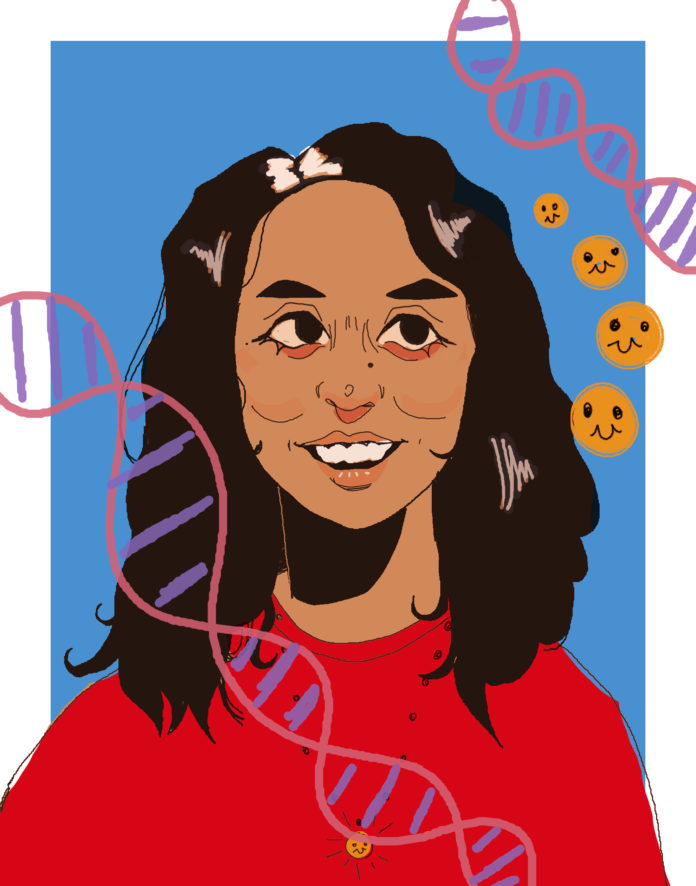I’m obsessed with learning things about myself. From astrology to Meyers Briggs to Enneagram to Hogwarts houses to Buzzfeed quizzes about which “Bachelor” contestant you are based on your Chipotle order, I’ve done them all. All of these are fake, but that’s why I like them: if I don’t feel like their assessment describes me, I can dismiss it.
Last summer, I took the next logical step in trying to figure out who I am: I took a DNA test through Ancestry. DNA contains the blueprints for who you are and determines almost everything about you, from eye color to personality. Ancestry allows users to connect their DNA to their family tree to find their relatives and “discover a more complete story of you.” It felt different from my past investigations. DNA doesn’t lie. I can’t run away from the secrets, or whatever else, it reveals — it’s like an oracle handing me my fate.
But while connecting family history and genealogy to DNA testing feels like a way to humanize the cold percentages of your ethnicity, it’s still data in the end. Like Buzzfeed quizzes and astrology horoscopes, DNA tests and genealogy only have meaning if you want them to.
DNA tests are getting more people interested in their family history, but I grew up surrounded by genealogy — my family is Mormon. Ancestry offers free membership accounts to members of the Church of Jesus Christ of Latter-Day Saints. When I was younger, I spent weekends digitizing census records, marriage certificates and death records, trying to decipher their loopy penmanship. My dad has a thick binder filled with meticulous family history documents. He would carefully type all of the names into Ancestry. Every Memorial Day, we’d head to the cemetery and clean the graves of ancestors who had served in the military. Despite all of this, I couldn’t make the jump from names in a book to people who once lived. Even though I never knew them, they’re supposed to somehow have a say in who I am.
I was taught that if you know your family history, it’ll help you understand who you are. It would make you a stronger person. A study by psychologist Marshall Duke says children who know their family history have higher levels of self-esteem — “our own stories are fashioned by frames provided by our families.” At church, youth would share stories about their Mormon pioneer ancestors who escaped persecution, proclaiming that “they were brave, so I am brave.” I have no pioneer ancestry, but I tried to find inspiration in people who stood up for what they believed in.
Studying abroad in Ireland last year, many of the other women in my program wanted to understand their Irish heritage. My maternal grandmother always bragged about her Irish ancestry. Her maiden name was Kelley. Although I said I went to Ireland for the literature, a part of me wanted that same connection others had to their family history. I spent my last weekend in Ireland at the Irish Emigration Museum learning about writers, rebels and musicians with Irish ancestry. Inside the museum was a family history center where people lined up to find their Irish ancestors and speak with genealogists. Everyone’s Irish, they seemed to say.
When I returned home, my dad gave me an Ancestry DNA kit. He had bought one for himself, but they accidentally sent him two. My brother and I joked about what we’d find. Maybe I wasn’t 50 percent Filipino and 50 percent white like I always knew. I know there’s no DNA requirement for me to participate in my own culture, but being mixed race, it’s still an anxiety of mine.
The results were anticlimactic: I had no Irish DNA. It implied that all of that work I put into understanding my grandmother’s heritage was for nothing. I said no. I still had one of the most common last names in Ireland, I studied the culture and I felt a kinship with Irish writers. Zoë Heller, who was conceived via sperm donation, writes that “genetic linkage doesn’t provide a fully formed origin story. Only human connection can do that.”
I started asking my parents for stories about themselves from when they were around my age. If my DNA percentages couldn’t tell me anything, and my family history was just names and dates, maybe the people I grew up with could. In high school, my dad would skip class to go to bookstores. No one thought my mom was smart because she was quiet, yet she got top marks on her college entrance exams in the Philippines. A DNA test couldn’t tell me this. I found far more meaning in their stories.
Last week, I was talking with someone about DNA tests. I told him I only took one because I got the test for free, otherwise I wouldn’t have.
“That’s the Filipino in you, only taking a DNA test because you didn’t have to pay,” he laughed.
The last time I logged onto Ancestry, I received a notification saying my DNA profile had changed. I had 4 percent Irish DNA. But it wasn’t an identity crisis or revelation, it was just some numbers.
Kristine White is a senior English major. She can be reached at kwhite2@oxy.edu.
![]()































